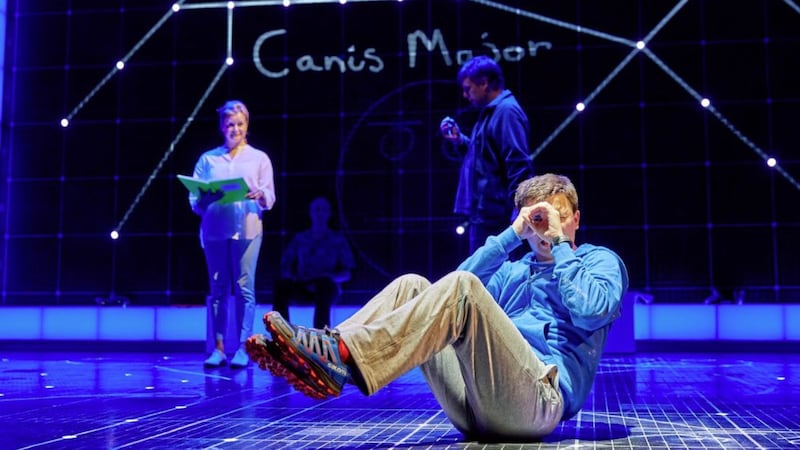IT'S a curious thing, adapting a play, muses prolific playwright Simon Stephens, because "you get to do what an actor does - just live in someone's imagination for a while".
There is no desire to stand under the stage lights himself, however, with the award-winning dramatist cherishing "the bravery" of those who bring his adaptations startlingly to life too much to do anything other than sit in the rehearsal room "in awe" and make cups of tea.
But as one of his best-known works, The Curious Incident of the Dog in the Night-Time (adapted from Mark Haddon's multi-award winning 2003 novel), returns to Belfast's Grand Opera House this week, the modest Londoner - whose mother grew up in Belfast - reveals he had to harness some bravery himself when first deciding to take on the challenging theatre project.
"Mark called me in 2008 and asked if I would make an adaptation for stage of Curious Incident," he says down the line from his home in east London, "and initially I thought, 'This is the nation's favourite book - what am I thinking?
"But then I thought, it's also one of my favourite books, so if anyone was going to do it, I thought I would have a crack at it. I felt very free and unafraid because Mark and I were friends and I always had the right to call him and say it was impossible to do... he was an exemplary collaborator all the way through and told me just to enjoy myself and have fun with it."
The play, charting the ordered - and disordered - life of teenager Christopher John Francis Boone and his extraordinary mind, premiered in 2012 and has since garnered a host of accolades, among them seven Olivier and five Tony Awards.
Its enduring appeal, Stephens believes, is rooted in its humanity, in its "bravery and kindness" and the fact "we all have the capacity to survive things that seem frightening at first".
"I think the story resonates deeply with people because it is about the complexity of family, all the difficulties and the possibilities," he expands.
"With the pandemic, some families have been spending more time together, while others have been distanced from each other, so the potency of family is as hot as it's ever been."
For those unfamiliar with the plot, The Curious Incident of the Dog in the Night-Time follows 15-year-old Christopher (played by David Breeds in this new 10th anniversary tour), a mathematical genius with "behavioural problems" who sets out to solve the mystery of who killed his neighbour's dog - discovering some unsavoury truths about his family along the way.
Although the novel never directly references autism, the protagonist shares many traits associated with Autism Spectrum Disorder - although Haddon later distanced himself from the phrase 'Asperger's Syndrome' which appeared on the book's cover when first published, following some negative reaction from the autism community.
In any case, because Christopher is never officially diagnosed in the story, his specific developmental disorder becomes less important than his unique interpretation of the world around him, as Stephens explains.
"Mark has created this boy whose way of seeing the world is just remarkable, but it's not that he sees a different world, but that he sees the world that we live in with more clarity, intelligence and grace than we could ever imagine," he explains.
"That allows us to see our world with that same clarity and same grace. For a little while, we can look at our world the way Christopher looks at it and that's a beautiful thing, I think."
Fortunately for the playwright - whose adaptation of Stephen King's The Shining is currently awaiting a theatrical "landing strip" - the Curious author also looked at his creation with new eyes, and more clarity, when first introduced to the stage script.
"I remember the first time Mark came to hear a reading of the play in the rehearsal room and how he cried because he had fallen out of love with the novel," Stephens reveals.
"He had fallen out of love with it because it was all he was ever asked about for 10 years and the play reminded him why he loved Christopher and that world in the first place.
"He came to first night at the National Theatre to see the preview and he loved it. He was bouncing around like Tigger and it was so exciting for me because I felt I had taken a risk with the adaptation and I really wanted him to love it."
It was not the easiest of adaptations, even for a visionary like Stephens, but after "landing on a couple of strategies" the process soon picked up pace. One was "rigorously" extracting the dialogue and behaviour from all the thoughts and ideas in the book and another was "stumbling across" the idea of having Christopher's teacher as narrator.
"I thought it would be a great shame if Christopher's voice was not heard in the theatre, but I puzzled over who could articulate those thoughts," he says.
"Then, I realised that his teacher, Siobhan, was one of just three people who reads Christopher's imaginary book - the actual novel written from his perspective - and she reads the book the same way we, the readers of Mark' novel, read it.
"She falls in love with Christopher's mind, but also, she's aware of things that he's not aware of; she's aware of the funny things he says, but she's also aware of the danger he might be in.
"The other thing that appealed is the fact I am from a family of teachers - my mum, who grew up in Sunnyside Street in Belfast, was a teacher and my grandad taught at Methody where my mum went to school, so there's a big relationship with Northern Ireland education in my family. I had never put a teacher in a play before, so I was quite excited that I could do that."
Following a history degree at York University, he taught for a while at a school in Essex until offered the opportunity to become resident dramatist at the Royal Court Theatre in London. Here, he taught the Young Writers' Programme until 2006 and was Associate Playwright between 2014 and 2018.
Originally planning to be a songwriter, he ended up playing bass guitar with art-punk band The Country Teasers instead - a band, he tells me, laughing, that still attracts 16,000 listens on Spotify each month.
Today, when not writing (he is currently working on "seven or eight" plays) he teaches scriptwriting at Manchester Metropolitan University.
"I have written for TV and film, but I just love the theatre," he stresses. "There is something about the 'liveness' of it and everyone being in the same room. And what I love about Curious is the way it appeals to people who don't necessarily go to the theatre - just the way the book appealed to people who weren't necessarily readers.
"I wanted to make a new play that would appeal to those people, I hoped they would come, that they would 'get' it and that they would be so excited by theatre. I think Curious has succeeded in that regard and I am very proud - although my children still keep telling me that all I did was type bits out of the novel and copy and paste."
:: The Curious Incident of the Dog in the Night-Time presented by the National Theatre and Trafalgar Theatre Productions runs at the Grand Opera House until Saturday. Details at goh.co.uk.






